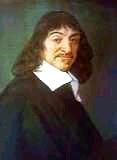デカルトの方法序説

ルネ・デカルト(仏: René Descartes、1596年3月31日 – 1650年2月11日)
デカルトの方法序説の第4部の冒頭部分の紹介です。
有名な ”われ思う、故にわれあり” にいたるところです。
いろいろ疑わしいものを、しりぞけていっても、それでも疑えないものがる。 今私が疑ったり、考えたりしていることだけは確実である。
「私は考える、それだから、私はある」
I think therefore I am.
(Latin: cogito ergo sum; French: je pense, donc je suis.)
コギト・エルゴ・スム
コギト(cogito)と言われるのは、このことを略していっているようです。なんとなく実感としてわかるようなきがしますが、ホッブスがいっているように「私は歩く、それだから、私はある」では、だめでしょうか?
デカルトは、本当に、考えることを止めることができたのでしょうか?確かにわたしなどは、電車でデカルトを読んでいるとき、一瞬意識が遠のくことがよくあるのですがその瞬間をとらえて実感できるとよいのですが、気づくときはタイミングてきに遅いですね。デカルトは精神の有無を言われていると思うのですが、意識の有無は関係ないですかね?
2番目の段落 (デカルトは、1段落が長いですね、おそらくこの英文も、翻訳したひとがくぎっているのでしょうね) にあるsubstanceと言う単語、哲学では実体と訳すそうですが、カントは、コギトは認めるけれどそれは実体(substance)ではないとバッサリきってしまったそうです。 そうするとこれ以降の段落の展開は、どうなるのでしょうか?デカルトは、コギトは実体だからということで、それ以降の展開、神様の存在まで言っているのですが?
古くからからの英訳は、すこし難しいので、最初にカナダの大学で翻訳された英文を最初に掲載します。
かなりわかりやすい英文です。古くから英文は最初の出だしだけ掲載します。
Discourse on the Method for Reasoning
Well and for Seeking Truth in the Sciences
Translated by Ian Johnston
Vancouver Island University
Nanaimo, BC Canada
PART FOUR
I don’t know if I should share with you the first meditations which I made there, for they are so metaphysical and so out of the ordinary that they will perhaps not be to everyone’s taste. However, in order that people may be able to judge if the foundations which I set are sufficiently strong, I find myself in some way compelled to speak of them. For a long time previously I had noticed that where morals are concerned it is necessary sometimes to follow opinions which one knows are extremely uncertain as if they are indubitable, as mentioned above. But since at that time I wanted only to carry out research into the truth, I thought I must do the opposite and reject as absolutely false everything about which I could imagine the least doubt, in order to see if there would be anything totally indisputable remaining after that in my belief. Thus, because our senses deceive us sometimes, I was willing to assume that there was nothing which existed the way our senses present it to us. And because there are men who make mistakes in reasoning, even concerning the most simple matters of geometry, and who create paralogisms, and because I judged that I was subject to error just as much as anyone else, I rejected as false all the reasons which I had taken earlier as proofs. Finally, considering that all the same thoughts which we have when awake can also come to us when we are asleep, without there being truth in any of them at the time, I determined to pretend that everything which had ever entered my mind was no more true than the illusions of my dreams. But immediately afterwards I noticed that, while I wished in this way to think everything was false, it was necessary that I—who was doing the thinking—had to be something. Noticing that this truth—I think; therefore, I am—was so firm and so sure that all the most extravagant assumptions of the skeptics would not be able to weaken it, I judged that I could accept it without scruple as the first principle of the philosophy I was looking for.
Then I examined with attention what I was, and I saw that I could pretend that I had no body and that the world and the place where I was did not exist, but that, in spite of this, I could not pretend that I did not exist. By contrast, in the very act of thinking about doubting the truth of other things, it very clearly and certainly followed that I existed; whereas, if I had only stopped thinking, even though all the other things which I had ever imagined were real, I would have no reason to believe that I existed. From that I recognized that I was a substance whose essence or nature is only thinking, a substance which has no need of any location and does not depend on any material thing, so that this “I,” that is to say, the soul, by which I am what I am, is entirely distinct from the body and is even easier to know than the body, and that, even if the body were no longer there, the soul could not help being everything it is.
After that, I considered in general what is necessary for a proposition to be true and certain, for since I had just found one idea which I knew to be true and certain, I thought that I ought also to understand what this certitude consisted of. And having noticed that in the sentence “I think; therefore, I am” there is nothing at all to assure me that I am speaking the truth, other than that I see very clearly that in order to think it is necessary to exist, I judged that I could take as a general rule the point that the things which we conceive very clearly and very distinctly are all true. But that left the single difficulty of properly noticing which things are the ones we conceive distinctly.
paralogisms 誤った推論
古い英訳の第4部冒頭
Chapter 4
I am in doubt as to the propriety of making my first meditations in the place above mentioned matter of discourse; for these are so metaphysical, and so uncommon, as not, perhaps, to be acceptable to every one. And yet, that it may be determined whether the foundations that I have laid are sufficiently secure, I find myself in a measure constrained to advert to them. I had long before remarked that, in relation to practice, it is sometimes necessary to adopt, as if above doubt, opinions which we discern to be highly uncertain, as has been already said; but as I then desired to give my attention solely to the search after truth, I thought that a procedure exactly the opposite was called for, and that I ought to reject as absolutely false all opinions in regard to which I could suppose the least ground for doubt, in order to ascertain whether after that there remained aught in my belief that was wholly indubitable. Accordingly, seeing that our senses sometimes deceive us, I was willing to suppose that there existed nothing really such as they presented to us; and because some men err in reasoning, and fall into paralogisms, even on the simplest matters of geometry, I, convinced that I was as open to error as any other, rejected as false all the reasonings I had hitherto taken for demonstrations; and finally, when I considered that the very same thoughts (presentations) which we experience when awake may also be experienced when we are asleep, while there is at that time not one of them true, I supposed that all the objects (presentations) that had ever entered into my mind when awake, had in them no more truth than the illusions of my dreams. But immediately upon this I observed that, whilst I thus wished to think that all was false, it was absolutely necessary that I, who thus thought, should be somewhat; and as I observed that this truth, I think, therefore I am (COGITO ERGO SUM), was so certain and of such evidence that no ground of doubt, however extravagant, could be alleged by the sceptics capable of shaking it, I concluded that I might, without scruple, accept it as the first principle of the philosophy of which I was in search.

